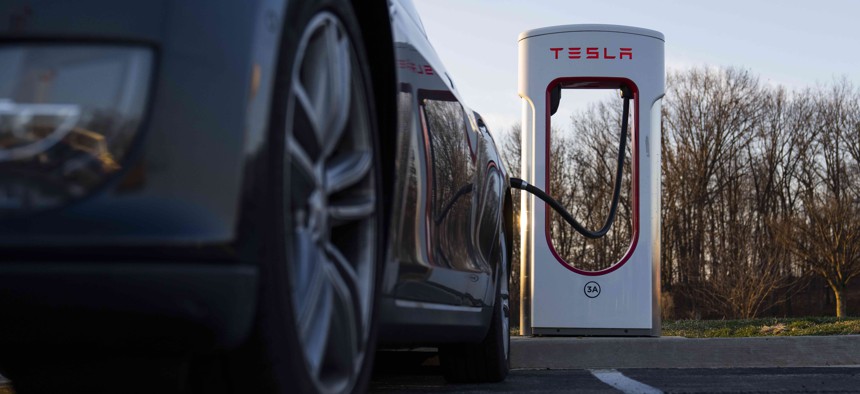How One State Is Rolling Out an EV Charging Tax System

Tom Williams/CQ-Roll Call, Inc via Getty Images
Iowa got a head start four years ago when it passed a tax on kilowatt hours sold. Here’s what they’ve learned so far.
While state lawmakers are currently debating new taxes for charging electric vehicles, Iowa is set to collect those taxes starting in July. Four years ago, when EVs were still rare on Iowa roads, legislators approved a law that taxes kilowatt hours sold.
Today, electric vehicles are still a small but growing share of the cars on the road. At the end of 2022, there were 4 million vehicles registered in the state overall. Of those, 6,000 were battery electric vehicles and 4,700 plug-in hybrids.
Route Fifty spoke with Stuart Anderson, the director of the transportation development division at the Iowa Department of Transportation, about the state’s experience so far in preparing for the new tax. Here are five key takeaways from that conversation.
The charging tax was years in the making.
The impetus for the changes was a law the Iowa Legislature passed in 2018 directing the state transportation agency to forecast the number of electric vehicles coming to the state, and how that transition would affect the state’s road fund. Lawmakers also asked for the agency’s recommendations about how to recoup lost gas tax revenue, which the state relies heavily on.
The agency made three recommendations:
- Add an excise tax per kilowatt hour for non-residential charging;
- Add registration fees for electric passenger vehicles;
- And add a hydrogen fuel excise tax.
The next year, the legislature passed those changes. But lawmakers added time for the rollout of the kilowatt-hour charge as some of the chargers being used in 2019 did not have a way to capture the number of kilowatt hours a customer used, Anderson said. Newer charges, though, can measure and report the amount of electricity used per customer.
The fees were intended to be revenue-neutral.
Some advocates questioned the creation of a new tax for EV users, arguing that it would discourage people from buying the cleaner vehicles. But lawmakers ultimately agreed to focus on how to keep road fund revenues steady.
“Iowa is very much a pay-as-you-go, user-fee-based system for roads and bridges. We don’t bond for it,” Anderson explained. He said the discussion centered on how to make sure electric vehicle owners were paying their “fair share” for the upkeep and construction of the road network.
“We did not make our recommendations and establish those rates to generate new money. This was solely based on how we could capture what we’re losing in fuel tax revenue,” he said.
Policymakers are especially worried about the revenue impact of electric trucks.
The increased registration fee is intended to capture most, but not all, of the lost fuel taxes from Iowa residents. The kilowatt-hour charge, however, would ensure that out-of-state EV drivers contributed to Iowa’s roads.
That’s especially important for large commercial trucks, which pass through the state on Interstate 80 and other major highways. Electric trucks are far less common than electric passenger vehicles, but they will likely become a bigger factor in coming years, Anderson said, noting that PepsiCo has announced plans to use 100 Tesla Semis for deliveries this year.
Some issues—like how to handle public chargers at apartment complexes—are still being worked out.
Homeowners would be able to avoid paying the new charging tax by plugging in their cars at home. But the Iowa Department of Revenue has not yet decided how to handle home charging for people in apartment buildings, who must rely on public chargers, Anderson said. “That’s an open discussion right now, as that rulemaking process is happening.”
The Iowa DOT isn’t interested in state-by-state mileage taxes.
Anderson said Iowa officials are aware of the many pilot programs in states to develop taxes that could charge drivers—regardless of the fuel they use—by the number of miles they drive. But they don’t think it’s feasible on a state-by-state basis.
“That study is necessary. But our perspective is that needs to be a national study and a national solution. Having 50 different per-mile systems isn’t the answer,” he said, particularly because of questions of what happens when drivers cross state lines.
Daniel C. Vock is a senior reporter for Route Fifty based in Washington, D.C.
NEXT STORY: Apartment Construction in US Rises to Levels Not Seen Since 1970s






